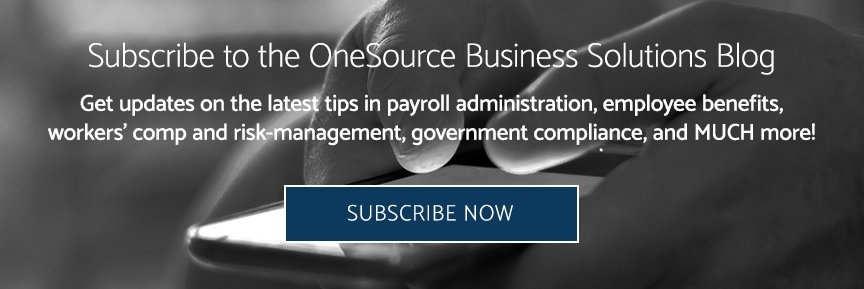OneSource Business Solutions Blog
How PEOs Attract Top Talent

Finding and attracting top talent is always hard, regardless of the job market. Even when unemployment is up, the very best candidates tend to be passive candidates.
These are people who already have a job, but would be open to a better opportunity if one presented itself. A study by iHire established that 17.4% of job seekers are passively seeking a job (for example, they are still on job alert email lists or have their resume on a recruiting platform), and many more are likely to be open to a change through networking or referrals. Attracting these superior candidates involves having a competitive advantage which is hard for smaller companies to gain.
Professional Employer Organizations (PEOs) can help you gain this advantage and get the talent that you need to grow your business.
Why Passive Candidates?
Passive candidates may or may not be looking for another job, but by definition they are not doing so actively. They have a job already - one they are reasonably happy with - and need to be actively motivated. To win them over, you need to have an advantage over the company that currently employs them.
People who are already well-employed are likely to be superior candidates to those who are unemployed or seeking to escape a poor-quality position. While many active candidates are that way for good reasons such as economics or a spouse relocating, others are without a good job for reasons which may or may not impact their ability to do a good job for your company.
Furthermore, because these candidates are not actively checking out job boards or being approached by recruiters, there will be less competition when trying to hire them.
Attracting these passive candidates can strengthen your business, especially as you move through a growth phase.
How to Attract Passive Candidates
So, how do you find and attract passive candidates? Here are some ways to make your company the kind of place that people want to work.
Strong Employer Brand
Too many companies don't worry about their employer brand. Having an employer brand strategy, though, is vital. It allows you to build a reputation for being a great place to work.
Make sure to conduct internal and external research to find out what your employees think about you and what your competitors are doing. Knowing this helps you know what you need to offer to attract candidates. Your recruiting strategy should tie into your employer brand, and you should seek candidates that fit your company culture.
Competitive Benefits
Very few people will (or can) change jobs unless the new job offers benefits at least as good as the one they are leaving. While the number one reason why people leave jobs is lack of advancement, 34% of job switches leave because they are unsatisfied with their compensation or benefits.
To attract passive job seekers, you need to make sure your benefits are particularly good, so these top candidates can afford to switch or are even motivated to do so. This is one area in which a PEO can be of particular help, as their resources and the ability to combine with other small companies allow you to lower the cost of employee health insurance and afford better benefits than you can manage on your own.
Employee Referral Programs
Finding passive candidates is a particular challenge. By definition, they aren't responding to your job postings or asking if you have opening. One of your biggest resources for finding them is your existing employees.
Satisfied employees will mention job openings to their friends, and 82% of employers rated employee referrals above all other sources in terms of ROI. Your employees will tend to refer people who fit in with your company culture, people they already get on with, and people they know have the abilities you need.
This only works, of course, if your employees are happy with their jobs, and that also requires the things already mentioned: good benefits and a strong employee brand.
How Can PEOs Help?
So, how can PEOs help with this? There are a few ways PEOs can help you attract passive candidates.
First of all, they take up routine administrative burdens. This allows your in-house HR staff, who have intimate knowledge of your company, to work on creating a strong employer brand. Your in-house staff can't do that if they are spending hours, for example, processing and filing payroll taxes.
Second of all, as already mentioned, they give you access to better benefits than you can afford on your own. Health benefits outsourcing through a PEO gives you access to their healthcare master plan, covering all of their clients. This lowers premiums and allows you to be able to provide a plan that supports your employees and their family.
Third, employees of a company that uses a PEO tend to be more satisfied than those without one. Employees report higher levels of employee engagement, trust, confidence, and intention to stay until retirement. They also feel that the companies have better HR policies and practices. This contributes to the success of employee referrals by making your employees much more likely to make referrals and pass on your job postings to people they believe will be a good fit.
Attracting passive candidates is important. Passive candidates tend to be of higher quality than active candidates, and have the abilities and experience needed to grow your company. PEOs can be vital to allowing you to offer the strong employer brand and competitive benefits that ultimately make the difference.
Recent Posts
Posts by Topic
- HR Outsourcing (37)
- Employee Benefits (14)
- Payroll & HR Administration (5)
- Strategic Planning & Research (5)
- Company Culture (4)
- HR Compliance (4)
- Industry – Professional Services (4)
- PEO (4)
- Workers’ Comp (4)
- Employee Turnover (3)
- OneSource PEO Company News (3)
- performance management (2)
- Navigating COVID-19 (1)
- manufacturing industry (1)
